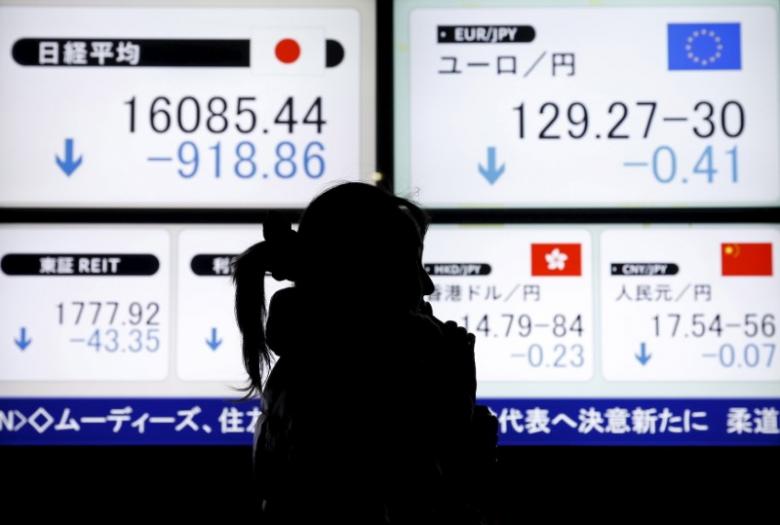Asian stocks slide as fresh Trump jitters damage risk sentiment

HONG KONG - Asian stocks posted their biggest drop in two weeks on Wednesday as growing doubts about Donald Trump's economic growth agenda prompted investors to dump risky assets and rush to safe havens such as gold and government debt.
Equity markets across the region were a sea of red and the Australian dollar nursed heavy losses as funds took profits from a two-week long rally, pushing a gauge of market volatility up to its highest levels this year.
Stock markets in Europe are set to take Asia's cues and open lower with key index futures pointing down after US stocks lost more than 1 percent in heavy trading.
"Asian stocks have had a good run so this is a good excuse to take some money off the table though there is plenty of cash waiting on the sidelines to be invested if the selloff intensifies," said Alex Wong, a fund manager at Ample Capital Ltd. in Hong Kong.
MSCI's broadest index of Asia-Pacific shares outside Japan fell 1.4 percent, its biggest intraday percentage fall since March 9. In the previous session, the index hit its highest level since June 2015.
Japanese stocks led regional losers, falling 2 percent, as investors ignored data showing exports grew the most in more than two years in February.
Australian shares tumbled 1.6 percent.
Despite the tumble, some investors such as Sherwood Zhang at Matthews Asia, part of a team that manages $26 billion in global assets, was optimistic about the outlook for Hong Kong stocks, citing relatively reasonable valuations.
With valuations stretched -- US stocks are trading at the upper end of their historical valuation ranges -- investors see the Trump administration's struggles to push through the healthcare overhaul as a sign he may also face setbacks delivering promised corporate tax cuts.
Expectations of those cuts have been a major driver behind the 10-percent surge in the S&P 500 since Trump's election and a subsequent rally in emerging markets since late December.
DECIDEDLY RISK-OFF
In a BofA Merrill Lynch survey conducted last week, 34 percent of investors found equities to be most overvalued of all asset classes, the highest proportion in 17 years, with US stocks identified as the most expensive.
"Investor positioning argues for a risk rally pause in March/April, with allocation to equities at a two-year high and bond allocation at a three-year low," said Michael Hartnett, chief investment strategist at the bank.
"Policy is the key catalyst for the Icarus trade to fly higher in the coming months."
With investor mood decidedly risk-off, the Japanese yen scored some chunky gains against the US dollar, rising to a four-month high of 111.60. The greenback slipped below a key level of 100 against a trade-weighted basket of its peers.
"Unlike the dollar and Treasuries, the 'Trump trade' still had an impact on equities. But if such impact on equities is to fade, it would weigh on dollar/yen. The dollar will also suffer against other currencies as US yields would decline," said Shin Kadota, senior strategist at Barclays in Tokyo.
Bonds gained with yields on two-year US debt falling to 1.27 percent in overnight trades, retreating further from a 7-1/2 year high of 1.38 percent hit last Wednesday when the US Federal Reserve raised interest rates.
Gold was on track to extend its overnight strong performance with the precious commodity perched comfortably at a two-week high of $1,245 per ounce.
Commodities other than gold, however, have had a rough outing with copper CMCU3 and iron ore prices SRBcv1 down sharply with a spike in volatility flushing out a lot of speculative positions.
Oil prices declined as concerns about new supply overshadowed the latest talk by OPEC that it was looking to extend output cuts. US West Texas Intermediate crude extended overnight losses to fall to fresh four-month lows at $48.07 a barrel. -Reuters







